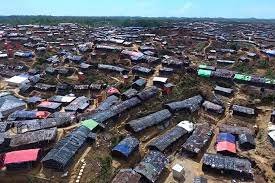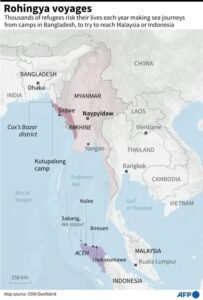Indonesia refutes Rohingya Refugees
Indonesian police and fishermen announced on November 25 that they had started monitoring sections of the westernmost province in the country to keep them from reaching its shores, in retaliation to the arrival of almost 1,100 Rohingya refugees in November.
Every year, thousands of people from the predominantly Muslim minority risk their lives by attempting to enter Malaysia or Indonesia by sea, frequently in shoddy boats, from refugee camps in Bangladesh.
This month, as the sailing conditions improved, over six dozen boats, some of which the locals attempted to turn back to sea carried hundreds of Rohingya refugees from Bangladesh into Aceh province.
East Aceh police announced that they now enforce 24-hour patrols, who oversee a regency of over 350,000 people and on Sunday saw the arrival of 36 Rohingya.
In an official statement, the force stated that it “has instructed its subordinate police precincts with coastal areas to intensify surveillance, both along the coastline and in the waters of the Malacca Strait, to prevent the entry of Rohingya immigrants.”
“Police chief Andy Rahmansyah stated that the police are on patrol around-the-clock to stop Rohingya immigrants from entering East Aceh.”
Amiruddin Ismail, the chief of Tanoh Anoe village in North Aceh, told AFP that patrols were increased on Friday night after fishermen reported seeing a Rohingya boat three kilometers off the shore of Muara Batu town.
Experts worry that after Malaysia, Thailand, and India discouraged the entrance of Rohingya, Indonesia may be the next nation to impose border controls.
For a long time, many Acehnese have felt empathy for the suffering of other Muslims.
However, some claim their patience has run out since the Rohingya sometimes clash with locals and use up their scarce assets.
Bangladesh Stops Rohingya Refugees to Sail for Indonesia
Bangladeshi authorities launched a crackdown on those who set ship for Indonesia on Saturday, Nov. 25 following the hundreds of Rohingya migrants from Myanmar who made the dangerous sea journey to flee filthy camps.
Some claimed to have given traffickers a comparatively large sum of US $1,000 in exchange for a spot on a boat.
One million Rohingya refugees, who are mostly Muslims, live in Bangladesh. Most of them escaped a violent military crackdown in 2017 that is currently the focus of a UN genocide investigation.
The congested, hazardous, and poorly equipped relief camps are home to many people. According to refugees, things are getting worse since food aid is being cut off, there are deadly gang fights, and there aren’t enough jobs.
Human traffickers are promising hundreds of Rohingya people places on boats headed for Malaysia and Indonesia as the Bay of Bengal’s waters calm after monsoon rains, police authorities told AFP.

Following their reported escape from camps to board boats at Teknaf, a Bangladeshi river port located directly across the border from Myanmar, police announced they had “stopped and held 58 Rohingya” on Friday night.
“There are nine males, sixteen women, and thirty-three children among them. Osman Goni, the head of the Teknaf police station, told AFP on Saturday that “we detained two Bangladeshi human traffickers who were allegedly guiding them.”
“They were ready to sail in a boat from Teknaf and were going to Indonesia and Malaysia.”
Who are Rohingya Refugees?
The Rohingya have endured decades of persecution and discrimination at the hands of successive Burmese governments. As a result of the 1982 Citizenship Law, they were effectively denied citizenship and are among the world’s largest stateless people.
Currently, a million Rohingya, the majority of whom fled Myanmar in 2017 to avoid the military’s crimes against humanity and potential genocide, are housed in cramped camps in Bangladesh.
An estimated 600,000 Rohingya people are still living in Rakhine State, where they face violence and persecution, are confined to camps and communities with little freedom of movement, and are deprived of access to enough food, healthcare, education, and employment opportunities.
The word “Rohingya” is frequently used to describe a Muslim group that is mostly concentrated in the state of Rakhine (Arakan) in Myanmar (Burma), however they can also be found in other regions of the nation and in refugee camps in Bangladesh and other neighboring countries.
They rank among the minorities that face the worst persecution worldwide. Early in the twenty-first century, it was believed that the Rohingya constituted one-third of the total population of Rakhine state, with the remaining two-thirds being largely composed of Buddhists.














Comments 2